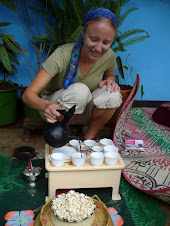Perhaps it is because I live among a people who speak a language that is still largely incomprehensible to me. Perhaps it is because the streams of communication that fill the world around me simply wash over me without seeping in to find understanding. Perhaps it is because, often lacking words, I commonly rely on the use of gestures, facial expressions, and other body language. Undoubtedly for all these reasons and many others beside, I feel a special attachment to the deaf students I have met here. Ever since that first visit to the special needs classes with Negalign, I have felt myself drawn back week after week to those beautiful children with whom I feel a singular sort of kinship.
My Tuesday mornings are spent invariably at the end of a rough wooden bench of students, learning to communicate with them in their voiceless voice. There are eight of them in this particular class, four girls and four boys, ranging in age from eight to eighteen. Among them are the eager twelve-year-old boy and 18-year-old girl, who race each other to be the first at the blackboard with the right answer; the tiny eight-year-old girl with the lemon-yellow dress, close-shaven head, beautiful bashful grin, and five-second attention span; and the fourteen-year-old boy with the gentle manner, who though frequently finding himself just a step behind his classmates, never allows his mistakes to discourage him from trying. They all sit in a row, a diverse collection of students brought together by virtue of their common impairment.
On this particular Tuesday morning, one of the five special education teachers is sick, so my teacher finds herself splitting time between three groups of students, one blind and two deaf. During the first morning period, the students' schedules have fortuitously aligned so that all are scheduled for math. My teacher starts at the blackboard in front of my group of eight, signing through exercises in addition and subtraction. Leaving them to practice with the bottlecaps that serve as their instructional materials, she moves on to the dozen blind students, running through the same exercises orally. She checks in quickly with the small, advanced groups of deaf students, who are left mostly to study independently. Then, she is back at the blackboard again, ready to repeat her whirlwind cycle.
The second morning session proves more difficult. My eight are scheduled for "sport and health." The advanced group has Amharic. The class of blind students has English. The cycle will no longer serve; it is time to divide and conquer. After receiving a cursory briefing on my assignment, I take charge of the English class. My job is straightforward. I am to read exercises from the one printed textbook so that each student may copy them in Braille to study at home. There are no Braille textbooks for their use. Meanwhile, my teacher is signing her way through the "ABCs" (Abstinence, Be Faithful, Condom Use) of HIV/AIDS prevention (trying to direct "C" over the heads of her younger students, in compliance with regulations). The advanced group, again, is left to study independently.
At the end of class, as students are dismissed for lunch, my teacher pulls me aside to ask, "What do you see are the strengths and weaknesses of my teaching?" It is possibly the most humbling moment of my Peace Corps service to date. Here is one teacher tasked with teaching 23 students, in three different groups, with two different impairments, at a spectrum of varying ages and abilities, in three different subjects simultaneously, with one textbook, a blackboard, and some bottlecaps at her disposal. Yet, rather than lament the difficulties of her situation, which she cannot control, she seeks advice for improvement in the areas of her teaching that she can control. In the midst of her hardships, she wants to be the best teacher she possibly can be. It is determination and drive like this that shines great hope for Ethiopia's future. I only hope that I can find a way to equip this determination and drive to better accomplish the noble ends that it seeks.
